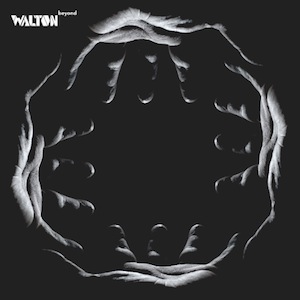Walton Beyond
“The sound of yesterday, today, tomorrow, and beyond,” says a disembodied talking head during the […]

“The sound of yesterday, today, tomorrow, and beyond,” says a disembodied talking head during the eponymous, brief opener on Beyond, Manchester-based tunesmith Sam Walton‘s debut LP. It’s an appropriate summation of both the Hyperdub label and Walton’s output, as Hyperdub has continued to diversify its reach following the partial collapse of dubstep that helped bring forth its birth, and Walton has proven to be one of the imprint’s more reliable rising talents in recent years. Across a series of increasingly confident EPs that began in 2011, the young alchemist has taken elements of the grime he grew up on and fused them with various strands of bassline, UK funky, and Detroit techno. Beyond is the most recent—and most accomplished—product of that process.
Even before Beyond, Walton had proven capable of synthesizing multiple genres into a sound of his own. His drums are often mechanically indebted, his basslines are precise, and his synths are often warm and resonant. Granted, these characteristics are all mainstays of garage and grime, but what really makes Walton’s tunes stick out is their balance of seriousness and playfulness. Lead single “Frisbee” is a perfect example, its descending notes lapping against double-time chords and haunted vocals. It’s designed for the dancefloor, but also refuses to stay in one place, preferring instead to keep expanding outward, which lends a sense of the unexpected to the proceedings. Elsewhere, on the leering house of “Grit,” Walton pairs a childishly mischievous synth with a rolling, sinister bassline.
Beyond truly begins to shine towards the album’s center. “You & Me” and “Memories” are both dependant upon a balance of twitchy, rusty drums and moaning, down-pitched vocals—although “Memories” gains extra mileage through some adrenaline-fed synth work. Sandwiched between those two tunes is the album’s most crowd-pleasing duo, the call-and-response vocal interplay of “Love on the Dancefloor” and “Every Night.” The former jumps off the same starting point of “You & Me,” its industrial clatter meeting a sensual three-chord Rhodes stab; before long, the song’s grime rhythm transforms into a jazz-tinged bounce, the composition anchored by a whispered vocal sample teasing the listener to “make your move” before adding, “I’m gonna dance away my clothes off.” It’s good fun, but the LP’s real payoff is the lush “Every Night,” where synth horns take the vocal sample from “Love on the Dancefloor” and refit it into a midnight banger.
When the album was first unveiled, Walton stated that the he “wanted there to be a contrast between bright and dark” and added that he “didn’t want to stick to a specific genre either. Just a vibe.” He follows through on that goal towards the album’s close, stuffing both the LP’s ambient interludes and its more straightforward bassline and Detroit house numbers at Beyond‘s end. Most impressive is the patient four-to-the-floor of “Amazon,” which tastefully beds dueling synth patterns, intermingling the song’s soft pads and noir-inflected chords with whispered reiterations of samples from previous album cuts.
While Beyond bags nearly every stake it claims, not all the tunes nail their mark. “Can’t You See,” the b-side to last May’s “Baby” single, is a fair, anthemic tune in its own right, but its inclusion here deadens the forward momentum of the LP’s brilliant middle section. Closer “City of God” also falls a little short, its ambient half-step ending things on a lackluster note, especially following the two house tracks which proceed it. Still, these are minor quibbles; overall, Beyond comes across as the work of a solid young producer finding both his groove and edge.

